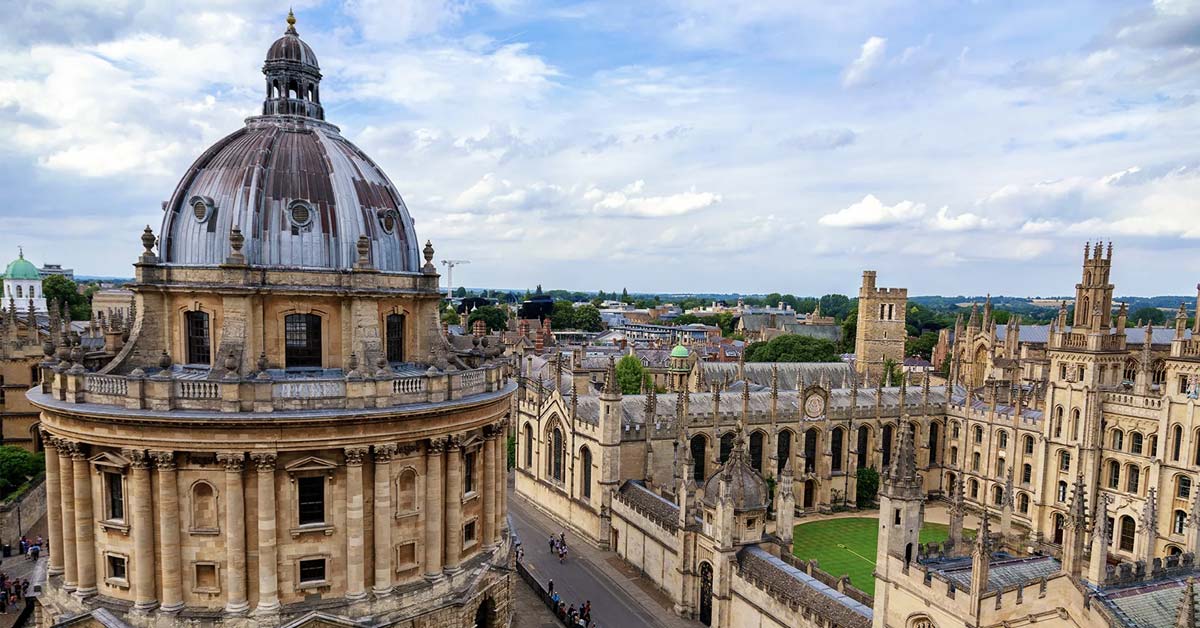via britannica.com
Oxford provides education for school children, young people and students from elite universities and leading private schools. Oxford private schools have a highly successful structure. Oxford educational institutions offer a wide variety of educational programs: bachelor’s and master’s degrees, language courses, summer schools, and entrance preparation. But it is these universities that have brought popularity to Oxford – the University of Oxford, Oxford Brookes University is often included in popular education rankings and tops the reviews of world analysts.
Today Oxford is a modern and promising city, one of the most culturally diverse centres in the UK, with several hospitals, the automotive industry, publishing houses, and technology companies located here. But the centre of attraction is the most prestigious university in the world: the University of Oxford consists of numerous educational institutions, including 38 colleges.
The British secondary education system
For many parents who contacted us about attending a British secondary school, it became a discovery of how different the British school system is. In England, school is compulsory for all and consists of three levels.
1. Primary education (elementary school)
Children in the UK start school at the age of 5 when they become primary school pupils. This stage consists of two steps.
Between the ages of 5 and 7, children learn English, mathematics and literature.
From the age of 7 to 11 years, in addition to the previously studied subjects, the pupil becomes familiar with exact, humanitarian, natural sciences and foreign languages.
It is from this stage that the majority of students begin their education in England. In elementary school, children do not have a huge amount of knowledge, everything is done to gradually get used to learning.
2. Secondary school education
From the age of 11 to 14, students start attending special vocational guidance courses.
From the age of 14 to 16, students prepare for their GCSE final exams and determine the subjects they need to enter university.
Compulsory education in the UK ends at this stage.
3. High School (Sixth Form)
From the age of 16 to 18, students who plan to go to university continue their studies at school. For the last 2 years, they have been studying the National A-Levels or the IB International Baccalaureate. Each student has their own set of subjects and, depending on their chosen major, they are accepted to the university based on their final exam results.
Benefits of studying at Oxford School
1. Quality of education
At a private school, students access everything that a British education with its century-old history and modern technology can offer. Studying at such a school is not easy, but the effort is bearing fruit: the vast majority of graduates from British boarding schools become students at the best universities in the UK and the world. Brighton College in Brighton, for example, boasts that more than 85 percent of its graduates go on to Russell Group universities each year, and about 20 percent go on to Oxford and Cambridge.
2. The opportunity to live and study on the same campus
By sending your child to a British boarding school, you can be sure that he will have everything he needs to live and study in comfort. It’s a comfortable room with everything you need and a dining room for three meals, as well as a library, sports facilities and creative studios.
3. Reputation
The British School Certificate of Education offers many opportunities for entry to world-class universities and being a graduate of a British School means that over the years of study, students not only receive a quality education but also become independent and self-sufficient. Responsible, for learning to interact with people from different cultures and to work individually and in teams.
4. Self-expression
All students and their parents notice one important advantage of British schools over other schools: there they give their children the opportunity to try anything: from drawing or performing in the school orchestra, to organizing events or playing soccer for the varsity team. Extracurricular activities are just as important as the subject curriculum because schooling in England aims to identify and develop each child’s abilities, which help in choosing future professions and provide additional points for admission.
How to prepare for admission to an English school?
In order to comfortably prepare your child to study abroad, you should first assess his independence and readiness for life separately from his parents. Also, do not forget about the level of the language.
It is worthwhile to start preparing at least one year before starting school, preferably earlier. In addition, it is important to deal with the financial aspects in advance: in order to obtain a student visa, it is necessary to accumulate a sufficiently large amount in the account of the child’s parents.
The procedure for entering a British school consists of the following stages.
- Preparation of documents and their submission to the selected institution.
- Passing the test (it can be taken online or in-person – depending on the requirements of the school).
- Conducting an online or personal interview based on the results of the test.
Students applying to study at an English secondary school must not only demonstrate good academic knowledge and a high level of English proficiency but also convince the selection committee of their positive life stance. Priority for admission is always given to talented students who can adequately represent the school in various competitions – the institution’s rating depends on this. Therefore, when preparing to move to the UK as a student, special attention should be paid to visiting circles and developing your talents. When collecting admission documents, it is worth paying attention to the requirements of a particular school – they may vary depending on the characteristics of the institution.
A general list of documents that must be sent with the application for admission includes
- School application.
- Questionnaire (you can find the form on the website of the chosen school).
- Information about the child’s parents, showing where they work.
- A translation of the last transcript and grades.
- Proof of successful completion of an international examination in English (IELTS or TOEFL).
- Letters of recommendation from teachers and school principals (in English or native language, with translation).
In some British schools, a letter of motivation is required to be added to the standard documentation package – an essay in which the child describes his reasons for transferring to study in the UK and entering this particular educational institution.
Rules and requirements for admission of foreign students change frequently: every year new rules are added, minimum passing scores on IELTS or TOEFL exams change and new opportunities arise. In order not to waste time searching for relevant information independently, you can use the services of experts in this field.
Cost of studying at Oxford
Tuition fees at Oxford schools start from £6,000-7,000 per semester and can go up to £14,000, depending largely on the course chosen and the reputation of the school.
Living in the UK is expensive – experts recommend £20-30 for a day’s stay in Oxford, £2,000 per semester for homestay accommodation and £3,000 per semester for residential (if not included in the cost) course).
ⓘ LAFFAZ is not responsible for the content of external sites. Users are required to read and abide by our Terms & Conditions.









